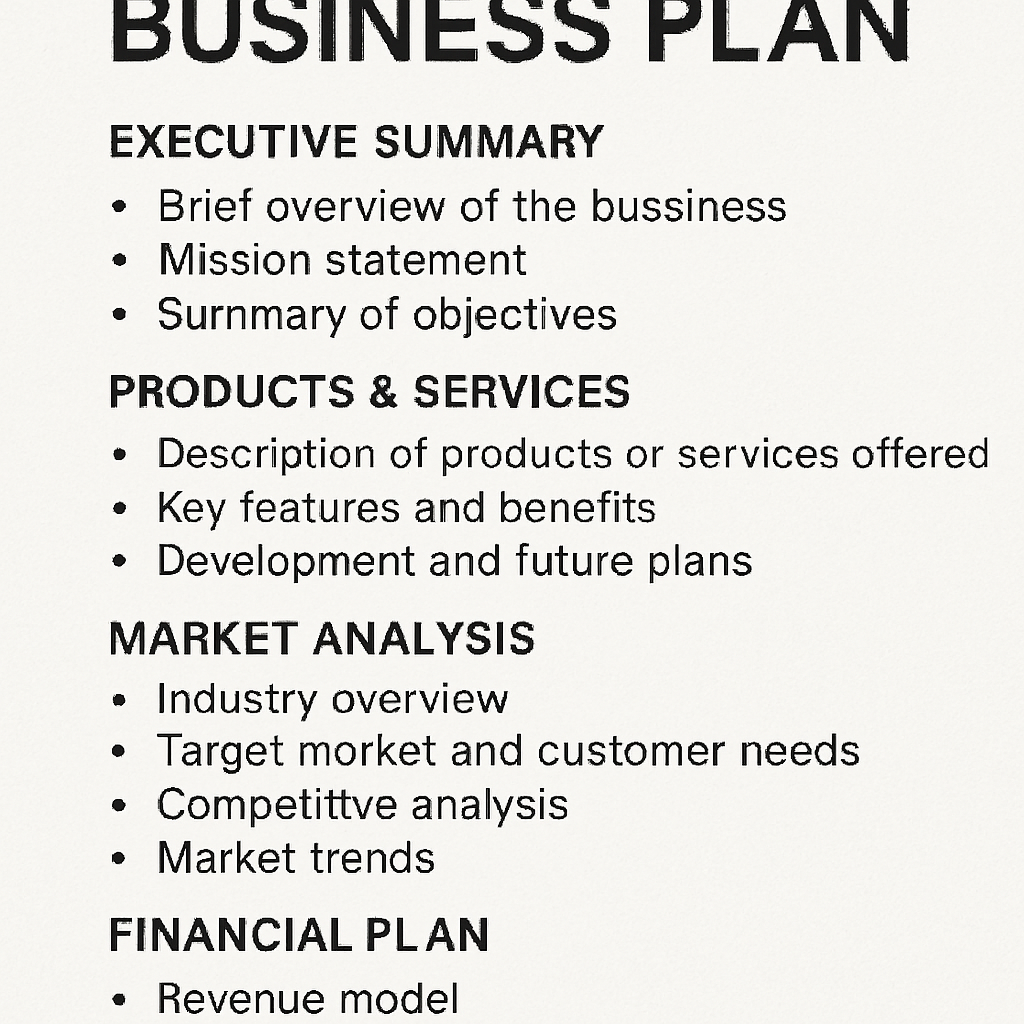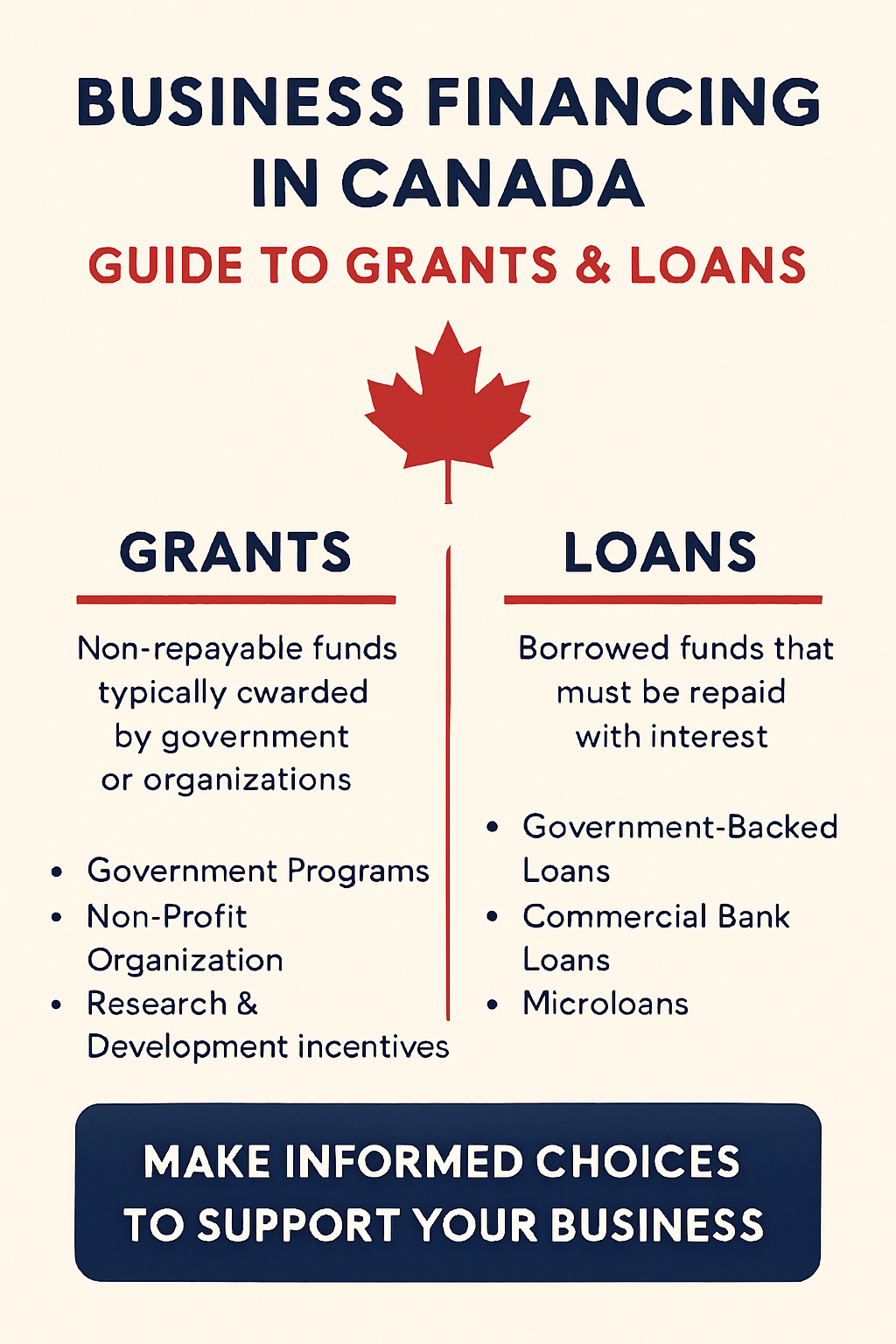Canada Business Grants
Canada offers a plethora of grants aimed at supporting businesses across various sectors. These grants usually provide funds that recipients do not need to pay back. They come from the government or other groups. Their purpose is to support business growth, new ideas, and job creation.
Types of Business Grants in Canada
- Federal grants support research and development. Programs like the Industrial Research Assistance Program (IRAP) and the Strategic Innovation Fund (SIF) provide this support.
- Provincial Grants: Each province offers specific grants tailored to regional economic priorities. For instance, Québec provides grants for AI advancements and international market exploration.
- Municipal Grants: Local governments may offer grants to stimulate economic growth within their communities.
How to Apply for Business Grants
Applying for grants involves:
- Identifying Eligible Grants: Use tools like the Business Benefits Finder to find suitable programs.
- Prepare a detailed plan that outlines your business objectives and explains how you will utilize the grant.
- Submitting Applications: Follow the specific guidelines provided by each grant program.
- Creating a compelling business plan is essential for securing both grants and loans. Plania simplifies this process with AI-powered tools designed specifically for entrepreneurs and small businesses.
Key Benefits of Using Plania:
- Fast Results: Build a complete, investor-ready business plan in under 45 minutes.
- AI Guidance: Step-by-step assistance tailored to your industry and funding goals.
- Financial Forecasting: Generate accurate projections to support grant or loan applications.
- Professional Exports: Download polished, branded PDF plans ready for investors and lenders.
- Whether you are applying for a government grant or asking a bank for money, Plania helps you present a strong case for funding.
Business Loan
Business loans are a common way for Canadian businesses to get money. You must pay back these loans over time with interest.
Types of Business Loans
- Term Loans: Lump-sum loans repaid over a fixed period.
- Lines of Credit: Flexible borrowing options up to a certain limit.
- Equipment Financing: Loans specifically for purchasing business equipment.
Eligibility Criteria
- Creditworthiness: A good credit score is often required.
- Business Plan: Demonstrating the viability and profitability of your business.
- Collateral: Some loans may require assets as security.
Small Business Loans
Small business loans cater specifically to the needs of smaller enterprises, providing accessible financing options.
Canada Small Business Financing Program (CSBFP)
This government-backed program makes it easier for small businesses to obtain loans by sharing the risk with lenders. It covers various expenses, including equipment purchases and leasehold improvements.
Application Process
- Contact a Participating Lender: Approach banks or credit unions that offer CSBFP loans.
- Prepare Documentation: Financial statements, business plans, and other relevant documents.
- Loan Approval: The lender assesses your application and decides on approval.
Business Loans for Small Businesses
Small businesses can access various loan options tailored to their unique needs.
Microloans
Organizations like Rise Asset Development offer microloans. These loans give small amounts of money to entrepreneurs. They often help those who cannot get traditional loans.
Alternative Lenders
Platforms like Swoop Funding offer alternative lending solutions, especially for businesses that have been declined by traditional banks.
Small Business Grants Canada
Canada provides numerous grants specifically for small businesses to encourage growth and innovation.
Notable Programs
- Futurpreneur Canada: Offers financing and mentorship to young entrepreneurs aged 18–39.
- Canada Summer Jobs (CSJ): Provides wage subsidies to employers hiring youth for summer positions.
- Women Entrepreneurship Loan Fund: Supports women-owned businesses with funding and resources.
Business Financing Canada
Understanding the broader landscape of business financing in Canada is essential for strategic planning.
Venture Capital
Canadian venture capital firms like BDC Ventures and Inovia Capital invest in startups and growing businesses. They provide capital, mentorship, and industry connections.
Government Programs
Programs like the Scientific Research and Experimental Development (SR&ED) Tax Credit offer financial incentives for businesses engaging in R&D activities.
Small Company Grants
Small companies can access grants aimed at specific sectors or business activities.
Sector-Specific Grants
- Technology and Innovation: Grants supporting tech development and innovation.
- Export Development: Programs like CanExport assist businesses in expanding to international markets.
- Environmental Initiatives: Grants for businesses focusing on sustainability and green technologies.
Business Loans Canada
Canadian businesses have access to various loan options through banks, credit unions, and alternative lenders.
Major Banks
RBC and BDC provide different loan options. These include term loans, lines of credit, and equipment financing.
Credit Unions
Local credit unions may provide more personalized lending solutions, often with competitive interest rates.
Business Lending Canada
The lending landscape in Canada is diverse, with options to suit different business needs.
Peer-to-Peer Lending
Platforms that connect borrowers directly with individual lenders, offering flexible terms and rates.
Government-Backed Loans
Programs that reduce the risk for lenders, making it easier for businesses to secure financing.
Entrepreneur Grants Canada
Entrepreneurs can access grants designed to support the launch and growth of new ventures.
Startup Canada
Provides resources and support for early-stage entrepreneurs, including access to funding opportunities and mentorship programs.
Regional Development Agencies
Offer grants and support tailored to the specific needs of entrepreneurs in different regions of Canada.
Grants to Open a Business
Starting a business often requires significant capital, and grants can provide the necessary funding without the burden of repayment.
Steps to Secure Grants
- Research Available Grants: Identify programs that align with your business objectives.
- Develop a Comprehensive Business Plan: Clearly outline your business model, market analysis, and financial projections.
- Make a Strong Application: Show how the grant will help your business succeed and match the grant's goals.
Business Grants for Small Businesses
Small businesses can benefit from grants that support various aspects of operations and growth.
Common Grant Uses
- Hiring and Training: Subsidies for employee wages and training programs.
- Technology Adoption: Funding to implement new technologies or upgrade existing systems.
- Market Expansion: Grants to explore new markets or expand product lines.
Canadian Business Grants
Canada's commitment to supporting businesses is evident through its extensive grant programs.
Accessing Grants
Utilize resources like the Business Benefits Finder to discover grants suited to your business needs.
How to Get a Business Loan
Securing a business loan involves several key steps:
- Assess Your Needs: Determine the amount required and the purpose of the loan.
- Check Eligibility: Review the lender's criteria, including credit score and business history.
- Prepare Documentation: Gather financial statements, tax returns, and a solid business plan.
- Apply: Submit your application to the chosen lender.
How to Obtain a Business Loan
Understanding the requirements and preparing thoroughly increases your chances of loan approval.
Key Considerations
- Credit History: Maintain a good credit score.
- Business Performance: Demonstrate consistent revenue and profitability.
- Collateral: Be prepared to offer assets as security if required.
How Can I Get a Business Loan
Exploring various lending options can help you find the best fit for your business.
Alternative Financing
Consider non-traditional lenders or government programs that may offer more flexible terms or cater to specific business needs.
Startup Funding Canada
Startups in Canada have access to various funding sources to kickstart their ventures.
Funding Options
- Angel Investors: Individuals who provide capital for startups in exchange for ownership equity.
- Venture Capital: Firms that invest in startups with high growth potential.
- Crowdfunding: Raising small amounts of capital from a large number of people, typically via online platforms.
How to Get Funding for Your Business
Securing funding requires a strategic approach:
- Identify Funding Needs: Clearly define how much funding is needed and for what purpose.
- Research Funding Sources: Explore grants, loans, and investment opportunities.
- Prepare a Compelling Pitch: Articulate your business value proposition and growth potential.
How to Get Business Loan in Canada
In Canada, obtaining a business loan involves:
- Choosing the Right Lender: Banks, credit unions, and online lenders each have different offerings.
- Understanding Loan Terms: Interest rates, repayment schedules, and fees vary between lenders.
- Meeting Eligibility Criteria: Ensure your business meets the lender's requirements.
How to Get a Business Loan in Ontario
Ontario offers specific programs and resources for businesses seeking loans.
Provincial Programs
- Ontario Centres of Excellence: Provides funding for innovation and commercialization.
- Regional Development Funds: Support businesses in specific regions of Ontario.
How to Receive Grants for Small Business
To successfully receive grants:
- Stay Informed: Regularly check for new grant opportunities.
- Tailor Applications: Customize your application to align with the grant's objectives.
- Seek Professional Advice: Consider consulting with grant writing professionals.
How to Get Grant Money for Small Business
Maximizing your chances of obtaining grant money involves:
- Demonstrating Impact: Show how the grant will benefit your business and the broader community.
- Providing Detailed Plans: Include timelines, budgets, and measurable outcomes.
- Maintaining Compliance: Adhere to all grant requirements and reporting obligations.
How to Obtain a Small Business Grant
Securing a small business grant requires:
- Eligibility Verification: Ensure your business meets the specific criteria.
- Comprehensive Application: Provide all requested information and supporting documents.
- Follow-Up: Stay engaged with the grant provider throughout the process.
Entrepreneurship Grants Canada
Canada supports entrepreneurs through various grant programs aimed at fostering innovation and economic growth.
Key Programs
- Innovative Solutions Canada: Funds R&D and prototype development.
- CanExport: Assists businesses in expanding into international markets.
How to Get a Business Loan with No Money
Obtaining a loan without upfront capital is challenging but possible.
Strategies
- Microloans: Smaller loan amounts with less stringent requirements.
- Credit Unions: May offer more flexible lending criteria.
- Government programs support entrepreneurs with limited resources.
How Can I Get a Loan to Start a Business
Starting a business with a loan involves:
- Developing a Solid Business Plan: Clearly outline your business model and financial projections.
- Identifying Suitable Lenders: Research lenders that specialize in startup financing.
- Preparing for Due Diligence: Be ready to provide detailed information about your business and personal finances.
How Do You Get a Loan to Start a Business
To secure a startup loan:
- Understand Loan Types: Determine which type of loan best suits your needs.



 Carl Lucier
Carl Lucier
